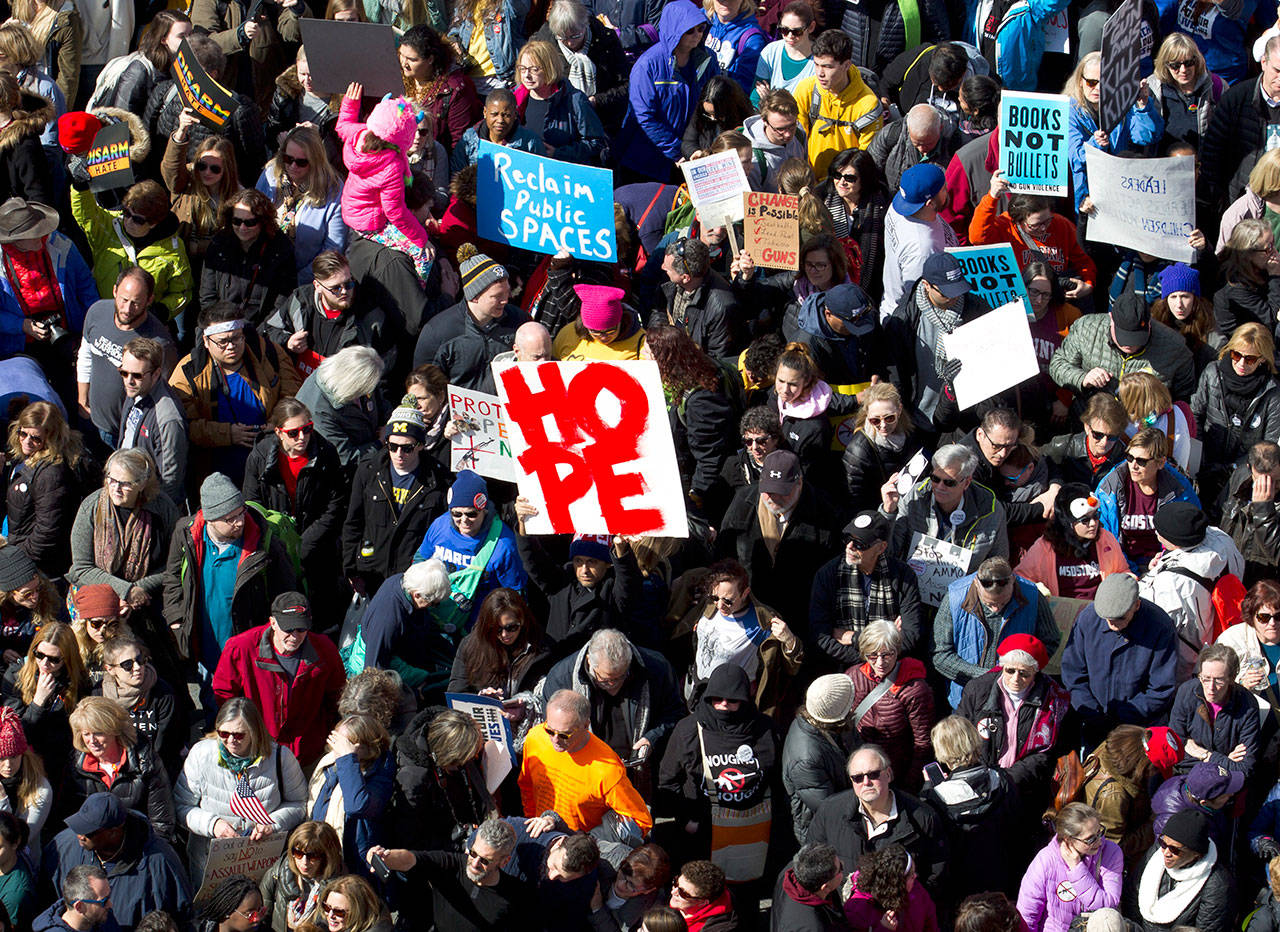By The Herald Editorial Board
The marches and protests continue. So have the shootings.
Saturday, hundreds of thousands of students and their supporters marched throughout the country, including in Washington, D.C., and in Everett and Marysville, in the March for Our Lives, demanding that an end to gun violence and greater safety in schools and communities be made priorities by lawmakers.
The day before, Jaelynn Willey, 16, died in a Maryland hospital, after she was removed from life-support. Jaelynn was one of two students shot March 20 by a fellow student at Great Mills High School in southern Maryland before the shooter was shot and killed by an armed school resource officer.
That shooting, of course, followed the Feb. 14 massacre of 17 students and staff at Parkland, Florida’s Marjory Stoneman Douglas High School by a 19-year-old former student. The outcry and demand for action, much of it led by the Parkland students and their peers across the country, have won moderate success:
Florida’s governor signed legislation that increased the minimum age for gun purchases to 21 from 18, created a three-day waiting period to allow more time for background checks to be completed and banned so-called bump stocks, the devices that allow semi-automatic rifles to fire at a rate comparable to illegal automatic weapons.
Congress, as part of the federal spending bill signed Friday by the president, adopted measures to strengthen the federal background-check system; clarified that the Centers for Disease Control and Prevention is not prohibited from conducting research on the causes of gun violence; and established grant programs to improve security at schools.
And Washington’s Legislature, given a slim Democratic majority in House and Senate, passed a ban on bump stocks. Unlike Florida’s lawmakers, however, it balked at legislation, Senate Bill 6620, that would have raised the age limit to purchase certain semi-automatic rifles to 21 from 18 and brought background-check requirements for those firearms in line with the rules for handguns.
The Legislature’s inability to do more regarding firearm measures, particularly SB6620, is disappointing. Sen. David Frockt, D-Seattle, told The Seattle Times earlier this month that had the bill been allowed votes in both chambers, it had the necessary support to pass, with even a few Republican votes. The bill had been amended to include school safety measures sought by Republicans.
But the bill was met with opposition from gun rights groups that have frustrated efforts in past sessions for even the most-limited measures regarding firearms.
44th District Sen. Steve Hobbs, D-Lake Stevens, explained to the Times the bill was brought up late in the session. “I don’t think it was fully vetted,” Hobbs said about a bill that passed a Senate committee, 14-7.
But that justification rings hollow in the face of support by Hobbs and most other lawmakers for the ill-fated bill — vetoed by the governor — that attempted to largely exempt legislators from the provisions of the Public Records Act. In the span of less than 48 hours, and with little discussion and no debate, lawmakers passed legislation that was far from “fully vetted.”
Current legislators and members of Congress running for re-election and their challengers would do well to consider the public support that is building for firearms legislation.
The Alliance for Gun Responsibility, a Seattle-based nonprofit advocacy group, released results of a February poll that was taken in four suburban legislative districts in Snohomish, King and Pierce counties, including Hobbs’ 44th District, which includes Lake Stevens, parts of Marysville, Snohomish, Mill Creek and surrounding areas of the county.
The polls of registered voters in the 5th, 30th, 44th and 47th districts found that majorities between 77 percent and 82 percent supported increasing the age to purchase so-called assault weapons to 21 from 18 and extending the background-check standard for handguns to those firearms.
The poll of 300 registered voters in the 44th District — 95 percent of whom said they were “almost certain” to vote in the November election — found 77 percent supported the increase in age limit, 64 percent who strongly favored it and 13 who somewhat favored the increase. Even among gun-owners in the 44th, the support was 68 percent.
The poll also asked if support for such legislation would cause them to be more likely to vote for a candidate. Majorities between 64 percent and 70 percent in each of the districts — 67 percent in the 44th District — said a candidate’s support for the legislation would make them “more likely” to vote for that candidate.
Candidates also need to consider the possibility of a surge among young voters in this year’s elections.
A nationwide poll of more than 4,700 adults for Cosmopolitan found that 68 percent of adults, ages 18 to 34, said they were “absolutely certain” to vote in this November’s elections, contrasted against the 25 percent who said they had voted in the 2014 midterm elections.
Candidates for the Legislature and Congress should expect to take some questions on their support for firearms legislation as students who turn 18 this year and their supporters, continue their march to the ballot box.
Talk to us
> Give us your news tips.
> Send us a letter to the editor.
> More Herald contact information.

























